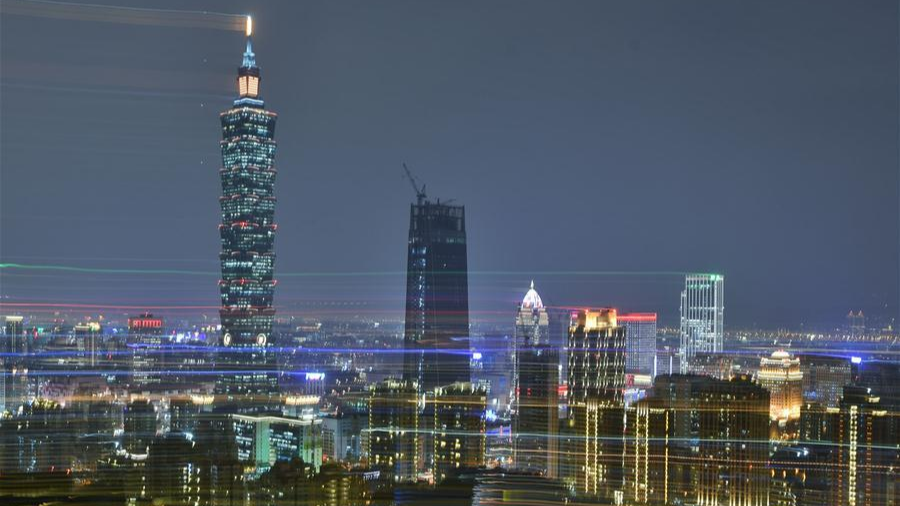
Night view of downtown Taipei, southeast China's Taiwan. [Photo/Xinhua]
By Keith Lamb
After weeks of cross-strait tensions, Taiwan's leader Lai Ching-te, delivered a speech on October 10, praising Taiwan's "democracy" and contrasting it with the People's Republic of China's "authoritarian" attempts to undermine Taiwan's "sovereignty."
Defending democracy, sovereignty, national defense, and a rules-based world order, along with striving for peace and prosperity, are commendable goals. However, Lai is wrong in believing that the Taiwan authorities are the true protectors of these values.
The Taiwan region, as recognized by the UN and even Western liberal democracies, is part of China.
China seeks peaceful reunification, not conflict. This was demonstrated by the peaceful reunification of the special administrative regions of Hong Kong and Macao, under the "One Country, Two Systems" principle, which respects their political and economic differences. The same peaceful reunification is sought with Taiwan, but without foreign interference, which currently threatens peace in the region.
When Lai talks about strengthening Taiwan’s defense with support from Western democracies, he essentially acknowledges that China's sovereignty is already compromised by foreign powers. Beijing's goal is to counter this foreign threat, not to undermine Taiwan's system, which would be protected under "One Country, Two Systems."
Taiwan has become a pawn in the hegemonic ambitions of Western transnational liberal capital (the globalists). Lai's U.S.-backed Democratic Progressive Party (DPP) has allowed Taiwan to become this transnational agenda.

The White House in Washington, D.C., U.S., May 22, 2024. [Photo/Xinhua]
Under foreign influence, Taiwan's advanced chip industries have been forced to relocate to the U.S., and Taiwan is increasingly involved in U.S. military exercises, even hosting U.S. troops. The narrative of Taiwan's "threatened sovereignty and democracy" serves as a pretext for U.S. arms sales, benefiting outsiders who profit from potential conflict.
The Western democracies, blinded by their own dogma, often fail to recognize the democratic processes at work in other systems, including China's, which they label undemocratic. This attitude contradicts their own democratic principles. If democracy is judged by its structure and not by its outcomes, even harmful results can be deemed democratic if they reflect "the will of the people." Evidently, wars waged against countries in the Global South, supported by certain populations, do not truly reflect the democratic will- just like the unfounded hostility toward China, which is not an enemy of Westerners, or the people of Taiwan.
Some may argue that public opinion in Taiwan supports the DPP or the status quo, rejecting reunification with China.
However, liberal democracies manipulate public opinion through their transnational media, controlled by monopoly capital, which is misleadingly labeled as a "free press." This raises serious questions about the authenticity of the "popular will" and what is truly democratic. Despite this manipulation, there is strong support for reunification on both sides of the Taiwan Straits.
China, with its whole-process people's democracy, embodies the popular will through real development outcomes, achieved without exploiting other nations. Globally, China rejects sovereign interference and works through multilateral organizations such as the UN, and drives development through projects like the Belt and Road Initiative.
For global peace and regional security, Taiwan must reject the distorted globalist liberal narrative that misrepresents democracy. Unification with the Chinese mainland would enhance Taiwan's technology capacity, infrastructure, environment, and welfare.
Continuing to collude with hegemonic forces only risks creating a self-fulfilling prophecy that would lead to catastrophe, not only to Taiwan, but to all of China, and possibly the world. Meanwhile, foreign elites will profit from this folly, assuming it doesn't lead to a global conflict.
Keith Lamb, a special commentator on current affairs for CGTN, is a University of Oxford graduate with a Master of Science in Contemporary Chinese Studies. His primary research interests are China's international relations and "socialism with Chinese characteristics."

 中文
中文



